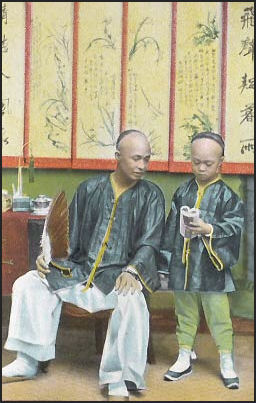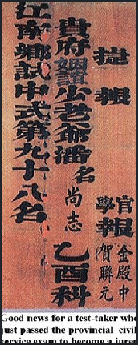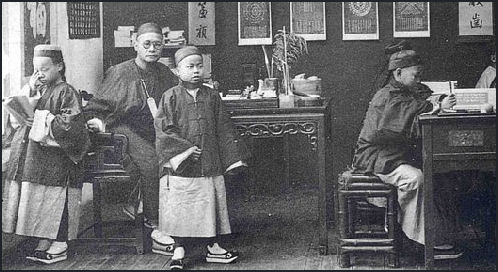EMPHASIS ON EDUCATION IN CHINA

Chinese school in 1901
There is a strong emphasis on education in China and Asia. Stanley Karnow wrote in Smithsonian magazine: "Like other Asians, who traditionally revere scholars, they value learning. They also see education as both the path to success and consistent with their sense of filial piety, the way to bring esteem to their family."
Parents prefer that their children study rather than play. A Chinese skateboarder told the Los Angeles Times, “If you play more, you study less. All Parents worry about that.” One student told Karnow: My parents "are really proud of me. So I have to keep improving, even if there is no room for improvement. I also feel their pressure. Just study, they say. I can't wash the dishes...or take a summer job. Their entire goal is to see me succeed.”
The Chinese education system encourages conformity and is adult driven and super-competitive. Students have traditionally been expected to be diligent, silent and obedient.
The word "jiaolu" is used describe the stress and anxiety of everyday life and pressure to study in China. A survey by the China Youth Daily found that 66 percent of young people felt they were under heavy stress. Only one percent said they were stress free. Parents also feel pressure. Mainland parents and teachers believe in starting education early. Mothers say they wouldn't dare to free their child from cram courses because "everybody else is doing that and nobody wants to be left behind".
Studies have shown that some Chinese children study 10 hours day. The zeal for education has spawned various undesirable effects, such as an increase in the number of student suicides, due to the worry and pressure of achieving high exam results.The suicide note of a 12-year-old girl who killed herself in Shanxi Province read: “Dear parents. I can hardly express my gratitude for bringing me up. But I feel under such pressure. There is too much homework. I have no choice but to die.”
See Separate Articles: EDUCATION IN CHINA: STATISTICS, LITERACY, WOMEN AND TEST SCORE SUCCESSES Factsanddetails.com/China ; HISTORY OF EDUCATION IN CHINA factsanddetails.com ; VILLAGE EDUCATION AND SCHOLARS IN 19TH CENTURY CHINA factsanddetails.com ; CHINESE EDUCATION SYSTEM: LAWS, REFORMS, COSTS factsanddetails.com ; CHINESE SCHOOLS Factsanddetails.com/China ; SCHOOL CURRICULUM IN CHINA factsanddetails.com ; PROBLEMS WITH THE CHINESE EDUCATION SYSTEM factsanddetails.com
RECOMMENDED BOOKS: : Education: “ “Education for Life” (China Academic Library) by Xingzhi Tao Amazon.com; “Education in China: Philosophy, Politics and Culture” by Janette Ryan Amazon.com; “Educational System in China” by Ming Yang (2009) Amazon.com; In the Past: “Confucian Philosophy for Contemporary Education” (Routledge International Studies in the Philosophy of Education) by Charlene Tan Amazon.com; “Neo-Confucian Education: The Formative Stage” by Wm. Theodore de Bary and John W. Chaffee Amazon.com; “Education and Society in Late Imperial China, 1600-1900" by Benjamin A. Elman and Alexander Woodside Amazon.com; “The Education of Girls in China” by Lewis Ida Belle (1887- 1969) Amazon.com; “The Chinese System of Public Education” by Ping Wen Kuo (1915) Amazon.com; Mao Era: “Radicalism and Education Reform in 20th-Century China: The Search for an Ideal Development Model” by Suzanne Pepper Amazon.com; “The Chinese System of Public Education (Columbia Univ Teachers College) by Ping-Wen Kuo (1972) Amazon.com;“My Family: a Normal Intellectual Family Suffered under the Rule of the Communist Party of China” by Luowen Yu Amazon.com
Education and Family in China
Education is seen as a family effort requiring a great deal of sacrifice, time and money. It is not unusual for families to sell their houses and go into massive debt to send their children to university.
Parents watch over their children carefully and guide and direct them. At an early age children are taught to memorize their textbooks. By Kindergarten they are attending a wide range of music, art and calligraphy classes. Some of this is in step with Confucian ideas of “self-perfection” and the Maoist notion of “all-around development,” with emphasis on practice, practice, practice.
One young man who was raised only by his mother in a poor village but managed to get into the medical school at Beijing University told Reuters, that after his father died “relatives and neighbors told me to study hard and that getting into a university is the way out.” The daughter of doctor who was brought up in a poor family told the Los Angeles Times her grandmother told her doctor father when he was a baby, “If you don’t study hard, it is worthless to have you as a son.”
One of the hottest selling books in the early 2000s was “Harvard Girl”. It was written by parents who described how they prepped their little girl, beginning when she was an infant, to succeed at a America’s most prestigious university. The book's success inspired a dozen or so imitations: “Harvard Boy, Cambridge Girl, Our Dumb Little Boy Goes to Cambridge” and “Tokyo University Boy”.
Chinese Sayings and Proverbs About Learning and Books
Frequent-said Chinese sayings about learning include: 1) “He who asks is a fool for five minutes, but he who does not ask remains a fool forever.” 2) “A closed mind is like a closed book; just a block of wood.” 3) “Better to light a candle than to curse the darkness.”[Sources: Candice Song, China Highlights, September 15, 2021; Veronika Gomez Skopalova, fluentin3months.com, wow4you.com]
“Learning is a treasure that will follow its owner everywhere.” A similar saying goes: “Learning is a weightless treasure you can always carry easily.” Another goes: “A good book is a as good as close-friend”. Yet another says: “Books till use time just-when hate few” This means when using books, you'll regret reading few and reminds us that we can never read widely enough.
“It's better to be without a book than to believe a book entirely.” “Reading books requires undivided attention, one word can be worth 1,000 gold”. This proverb reminds us that reading requires concentration No single word should be passed over before we fully understand it. Only in this way can study be rewarded.
Chinese Sayings and Proverbs About Education, Teachers and Studying

1) “Live till old, study till old”. This means "Don't stop studying" or "you're never too old to learn." [Sources: Candice Song, China Highlights, September 15, 2021; Veronika Gomez Skopalova, fluentin3months.com, wow4you.com]
2) “Strict teacher produces brilliant student”
3) “Study but not think then deceive, think but not study then dangerous” — Learning without thought is deceptive; thought without learning is perilous.
4) Teachers open the door. You enter by yourself. This means a teacher can show you the way, but the rest is up to you.
5) “Everything starts hard.” Or: “Beginnings are always the hardest.” “Today’s tasks are to be completed today.” “Don’t put off until tomorrow what can be done today.”
6) “Three unskilled (“smelly”) cobblers are better than one Zhuge Liang.” This Chinese proverb means “Two heads are better than one.” Zhuge Liang (Kongming) was a famous strategist in ancient China and recognized as very intelligent and accomplished.
7) “You cannot catch tiger cubs without entering the tiger’s lair” — “No pain, no gain.” “To want to get fat with only one bite” means “to be impatient for success” and can be translated as “learn to walk before you run.”
8) “Green come-from blue and surpasses blue.” This is used to describe when a disciple has surpassed his master.
Chinese Sayings and Proverbs That Offer Encouragement
1) “No matter how tall the mountain is, it cannot block the sun.” [Sources: Candice Song, China Highlights, September 15, 2021; Veronika Gomez Skopalova, fluentin3months.com, wow4you.com]
2) “Opportunity can't lose, the time may not again come” — Opportunity knocks but once.
3) “People heart together, Mount Tai move” — When people work with one heart, they can even move Mount Tai.
4) “All you need is to grind an iron rod grind intp needle” This proverb encourages one to persevere to succeed.
5) “A day's plan lies in dawn” — A day's planning is done at dawn. I.e. make your plans early, or get up early, as this will affect the whole day/undertaking.
6) “A 1,000-li [500 kilometers] journey, start with one step.”
7) “First arrive first get” — "the early bird catches the worm."
8) Keep-watching the clouds to see moonlight” Watch the clouds until they part and reveal see moonlight."Every cloud has a silver lining" or trouble will pass.
9) “Wind not always favorable; soldiers not always win.” This proverb urges us to be fully prepared for difficulties and setbacks.
10) “Star's fire, can shine far” — Starlight shines far. Translated as: "A single spark can start a prairie fire." Seemingly small actions have far-reaching consequences.
Education in Rural Areas in China
In many rural areas, children only attend primary school if they attend school at all and often stop going after three or four years. Some rural schools do not extend past the third grade. It is not unusual for a district with thousands of school age children to have fewer than a hundred actually in the local school, with only a handful finishing the six grades.
Textbooks are in short supply and have been so heavily used the paper is sometimes cracking and transparent with age. Paper, pens and pencils are also in short supply and children often write on slates with broken pieces of chalk.
Many villages build their own schools and then ask the government for a teacher. Classes are often taught in local languages which are little value in the major cities where most of the jobs are and other languages predominate.
Like parents around the world, poor villagers want their children to succeed in school, but the obstacles just to get them enrolled are enormous. Even though schools are free, the books and clothes required to attend are so expensive they can eat up as much a third of the villager's income.
A family that grows a cash crop may bring in $120 a year after expenses for fertilizer and pesticides while schools charge $75 a year per student for uniforms and books. Since most families average between four and eight children, even with father working odd jobs, there is usually only enough money to send two or three children to school at the most.
In many cases, children go to school and learn to read but fail to improve there lives. Even students that are bright and privileged to attend university find there are no jobs waiting for them when they graduate.

Future mandarins
Confucianism, Education and Administration
Confucius is credited with organizing China's first educational system and setting up an efficient administration system, based on the careful selection of a bureaucracy that helped the emperor and other leaders rule. Members of the bureaucracy were trained in special schools and chosen for their jobs based on their the proficiency on a civil service exam that tested their knowledge of Confucian texts. Before Confucius's time the only schools in China were ones that taught archery.
Confucius regarded government and education as inseparable. Without good education, he reasoned, it was impossible to find leaders who possess the virtues to run a government. "What has one who is not able to govern himself, to do with governing others?" Confucius asked. Under Confucianism, teachers and scholars were regarded, like oldest males and fathers, as unquestioned authorities.
The basic principal behind Confucian education is that if you work hard, endure and suffer as a young person you will reap rewards later in life. The strategy of Confucian education, used in China for centuries, is to memorize the moral precepts in the hopes that they will rub off and improve the character of the person who memorizes them and makes him or her more moral. Teachers have traditionally been held in high esteem and their power and control has been regarded as almost absolute.
The notion that the Confucian system was based totally on merit and lacked a hereditary element is not true. Children of merchants, landowners and families with money had an advantage in that their parents could hire tutors to teach them how to properly write Chinese characters and study Confucian texts. Once they attained their position, Confucian gentlemen made sure their sons studied the classic and was prepared for the exams.
See Separate Article CONFUCIANISM, GOVERNMENT AND EDUCATION factsanddetails.com
Chinese Civil Service Exams
Scholar-bureaucrats civil servants who ran the Chinese imperial government are known in the West as Mandarins (a term coined by the British). They were China's best and brightest, and served the emperor in the imperial court and as imperial magistrates and representatives in the hinterlands.
Civil servants were recruited and promoted through a series of examinations. These tests were, theoretically at least, open to anybody and were responsible for a considerable degree pf social mobility. Success could bring privileged status and wealth to even the most humble born.
The Chinese Civil Service Exam was essentially a test of knowledge of Confucian texts. For 2000 years, up until 1905, the heart of the exam was knowledge of the Four Great Books and Five Classics of Confucianism, including Confucius's “Analects, the Book of Mencius, the Great Learning”, and the “Doctrine of the Mean”. Test takers were given a certain amount of time (sometimes six weeks) and they were supposed to write everything they knew. Ideally, the students with the best scores were chosen for the best positions in the bureaucracy.
There were local, provincial and palace exams and they covered a number of topics, including poetry, philosophy, politics and ethics. Passing was said to be more difficult than getting into Harvard. Stephen West, a Chinese literature professor at Berkeley told U.S. News and World Report, "The magnitude of their accomplishments is impressive. It would be as if a Henry Kissinger was a gifted poet. Or if W.H Auden was also a superb government policy specialist."
Preparations for the test usually began around age five when young boys were taught to bow respectfully and recite lines from classical texts. The most promising teenagers were sent to study under masters in the Chinese capital. They were taught poetry, essay writing and Confucian scholarship. Many students failed the exams. In the year 998, only two students passed the highest, or “jin-shi” test. Scholars sometimes cheated on the civil service exams by writing down answers on a special shirt worn under their robes. There also many stories in Chinese literature of promising students who failed on the test because they were corrupted by women and alcohol.
See Separate Articles CHINESE LITERATI AND SCHOLAR-ARTIST-POETS factsanddetails.com ; CHINESE IMPERIAL EXAMS factsanddetails.com CHINESE SCHOLAR-OFFICIALS AND THE IMPERIAL CHINESE BUREAUCRACY factsanddetails.com ;
Image Sources: Landsberger Posters ; Columbia University, University of Washington; Ohio State University
Text Sources: New York Times, Washington Post, Los Angeles Times, Times of London, National Geographic, The New Yorker, Time, Newsweek, Reuters, AP, Lonely Planet Guides, Compton’s Encyclopedia and various books and other publications.
Last updated August 2022
